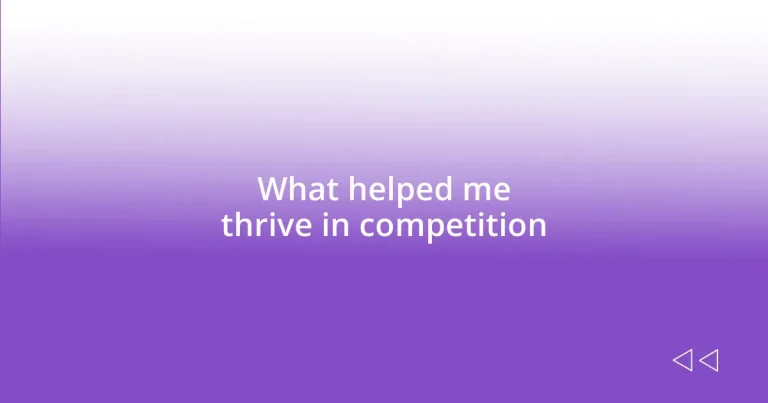Key takeaways:
- Understanding the competitive landscape involves deep analysis of competitors to identify gaps and opportunities for innovation.
- Developing a winning mindset is rooted in self-belief, resilience, and surrounding oneself with a supportive network.
- Building effective support networks focuses on trust, reciprocity, and mutual growth through collaboration.
- Continuous self-improvement is essential, involving self-reflection, seeking feedback, and embracing a growth mindset after setbacks.
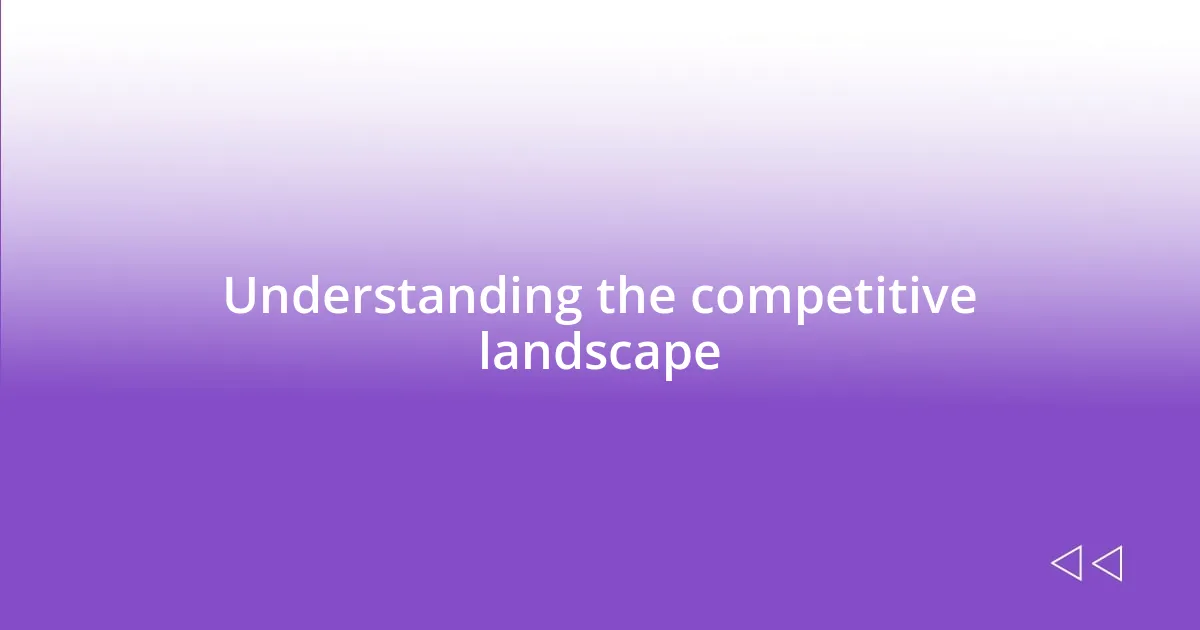
Understanding the competitive landscape
Understanding the competitive landscape requires more than just a snapshot of your rivals. It’s about diving deep into their strengths, weaknesses, and strategies. When I first entered the industry, I was surprised to find that it wasn’t just about the products we offered, but how we positioned ourselves in the minds of our customers.
I remember a specific moment during a market analysis meeting where I unveiled insights that shifted our entire approach. The buzz in the room when we recognized a competitor’s gap was electrifying. It made me realize how crucial it is to keep your finger on the pulse of the competition—what are they doing well, and where are they faltering? This insight sparked a sense of urgency within us to innovate and differentiate our offerings.
Have you ever felt overwhelmed by the sheer number of competitors vying for attention? I certainly have. Embracing that reality can be daunting, but I learned that rather than seeing them as threats, they can be valuable allies in understanding market trends. By studying their moves closely, I found unique opportunities to carve out my niche and cultivate a genuine connection with my audience.
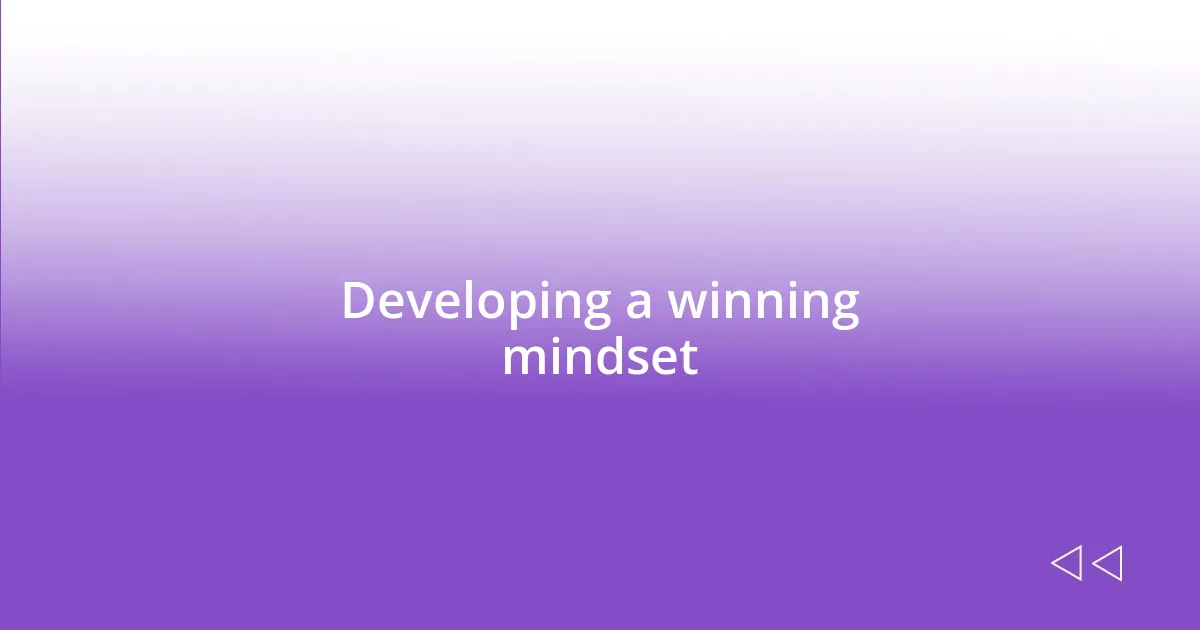
Developing a winning mindset
Developing a winning mindset starts with a belief in oneself. I vividly recall the first time I faced a significant challenge—walking into a competition where everyone seemed more experienced. My heart raced and self-doubt crept in, but I reminded myself that my unique perspective brought value. As I grounded myself in that belief, I noticed my confidence began to translate into my actions. That shift was pivotal for me; your internal narrative can truly shape your external success.
Another important aspect of this mindset is resilience. I remember a project that didn’t go as planned, and it felt utterly disheartening. But instead of wallowing in my disappointment, I decided to view it as a learning experience. This approach shifted my perspective—seeing failures as stepping stones rather than roadblocks. I realized that each failure teaches invaluable lessons, and embracing them has allowed me to grow and emerge stronger.
Lastly, surrounding myself with like-minded individuals has always been critical in fostering a winning mentality. I joined a local group of entrepreneurs who motivated each other to push boundaries. I recall nights spent sharing ideas, listening to each other’s struggles, and celebrating small victories. The camaraderie fueled my ambition and helped me remain focused on my goals. Building a supportive network has made all the difference in maintaining a positive mindset and thriving in competition.
| Key Elements | Description |
|---|---|
| Self-Belief | Trusting in your unique qualities enhances confidence and performance. |
| Resilience | Learning from failures transforms setbacks into growth opportunities. |
| Supportive Network | Connecting with like-minded individuals creates motivation and accountability. |
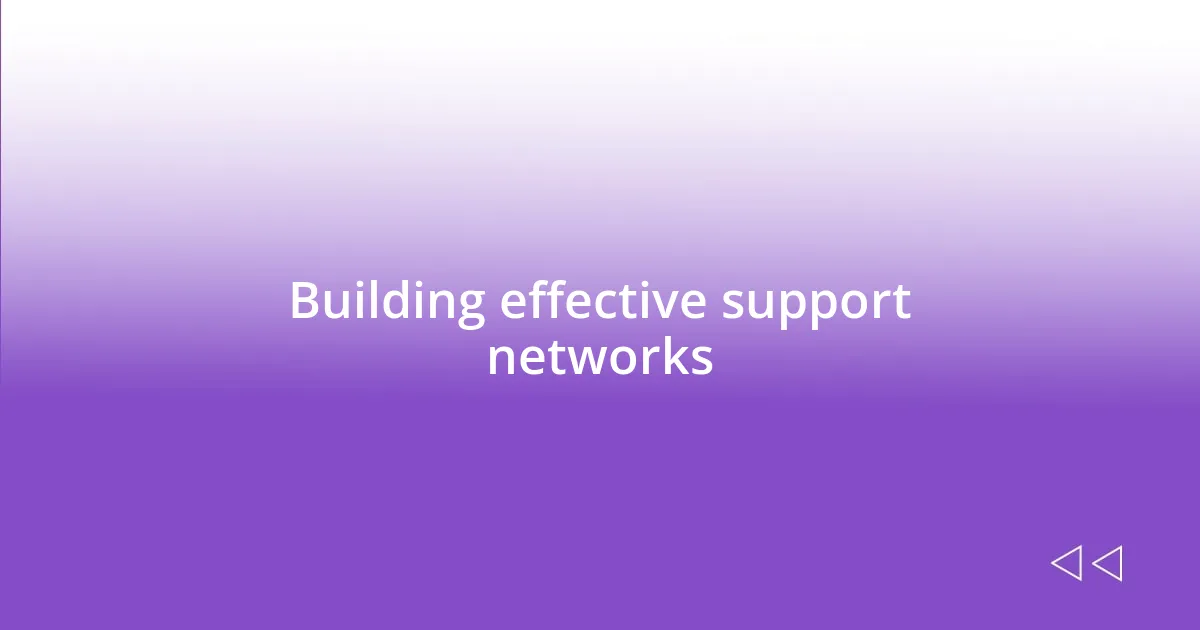
Building effective support networks
Building a strong support network has been a game-changer for me. Early in my career, I reached out to a few mentors who were willing to share their insights. I vividly remember a coffee chat with one seasoned entrepreneur who revealed the importance of collaboration over competition. That conversation opened my eyes to the benefits of mutual support. It wasn’t just about what I could gain; rather, it was about how we could uplift each other in our respective journeys.
As I fostered these relationships, I realized effective support networks are built on trust and reciprocity. When I found myself facing daunting challenges, my network was there to offer guidance, resources, and sometimes just a listening ear. Those moments taught me the value of showing vulnerability, as it invites others to share their experiences too. I discovered that we’re often in the same boat—navigating the highs and lows of our paths—with each connection deepening our shared resilience.
Here are some key strategies for building effective support networks:
- Seek Diverse Perspectives: Connect with individuals from different backgrounds to gain fresh insights.
- Engage Regularly: Foster relationships by reaching out often, whether through casual meetups or active participation in community events.
- Share Resources: Be open to sharing your knowledge and resources, encouraging a culture of give-and-take.
- Be Vulnerable: Don’t hesitate to share your struggles; it invites connection and fosters deeper relationships.
- Celebrate Wins Together: Acknowledge each other’s successes to strengthen your bond and keep motivation high.
I can’t stress enough how crucial it is to lean on those relationships during tough times. Whether it’s brainstorming solutions or simply enjoying a laugh, having a solid support network has transformed my competitive experience into a collaborative adventure.
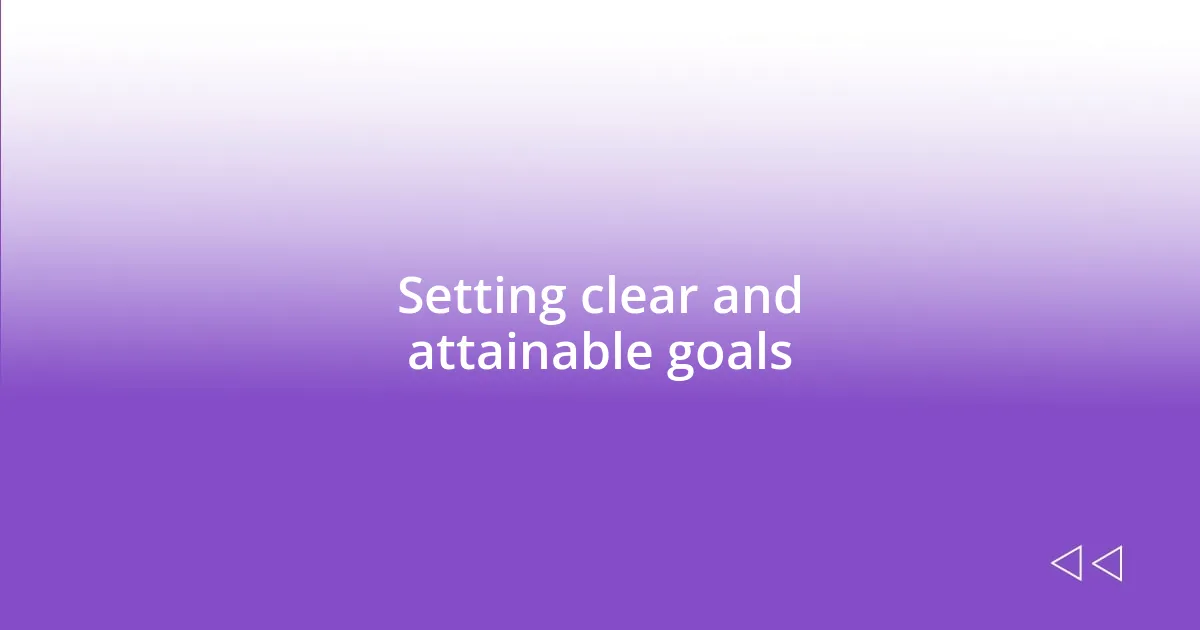
Setting clear and attainable goals
Setting clear and attainable goals has been a cornerstone of my competitive journey. I still remember setting my first significant target during a project that felt nearly insurmountable. It was daunting, yet breaking it down into smaller, manageable objectives turned that mountain into a series of hills I could climb. This approach not only clarified my path but also gave me a sense of achievement as I celebrated each small win along the way—it’s amazing how motivating it can be to tick off those mini-goals.
There’s also a sense of direction that comes with having clear goals. I often think about the times when I went into a competition without a solid plan, feeling lost among my peers. Those moments taught me how vital it is to define what success looks like for me, whether it’s improving my skills, gaining a certain level of recognition, or just pushing my limits. Having a clear target provides a roadmap that keeps me focused, especially when distractions crop up. Have you ever felt overwhelmed by choices? Trust me; a well-defined goal acts like a lighthouse in a foggy sea.
Setting goals shouldn’t be rigid, though. I learned the hard way that sometimes life throws curveballs. Midway through a crucial project, I realized my objectives needed adjusting. It was a tough call, but being flexible and willing to adapt made all the difference. I embraced the changes, allowing myself to recalibrate my aspirations while still keeping the core motivation alive. This lesson reminded me that thriving in competition isn’t just about sticking to the plan; it’s about evolving along the way. What’s your experience with goal-setting? Have you ever had to pivot?
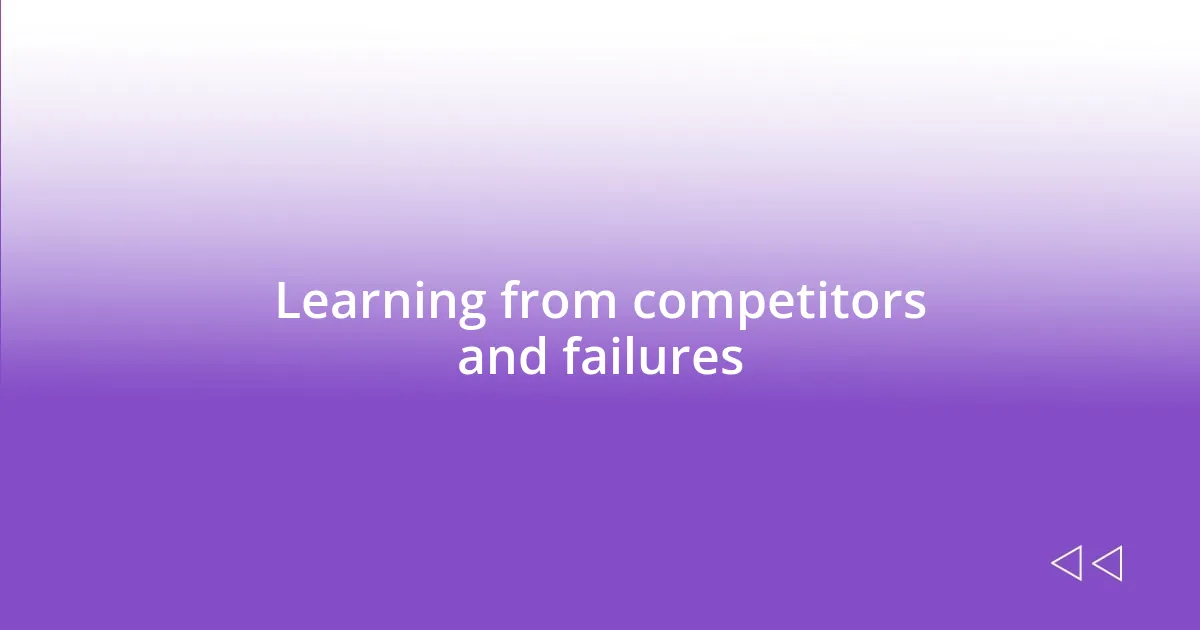
Learning from competitors and failures
Learning from competitors and failures has been a crucial part of my journey. I recall one competition where I fell short despite my best efforts. Rather than wallowing in disappointment, I decided to closely analyze what went wrong. I studied my competitors, noting their strengths and strategies. It was eye-opening to realize that my failures weren’t just obstacles; they were golden opportunities for growth. How often do we overlook valuable lessons in our setbacks?
One of my biggest takeaways was the importance of adopting a mindset of continuous improvement. I remember a time when I encountered a particularly innovative rival. Instead of feeling threatened, I took this as a chance to learn. I observed their unique approach to problem-solving and realized I could incorporate some of those strategies into my own practice. Have you ever watched someone excel and thought, “I could learn a thing or two from that”? I certainly have, and it’s a perspective that has fueled my progress.
Embracing failures not only fosters resilience but also paves the way for creativity. After a disappointing pitch, I found myself reflecting on the feedback I received. It stung initially, but then I started to see it as constructive criticism. This shift allowed me to tweak my ideas and present them in a more compelling way next time around. Failing doesn’t mean I’m done; it means I have the chance to revisit, refine, and excel. Isn’t it fascinating how a little shift in perspective can transform our setbacks into stepping stones?
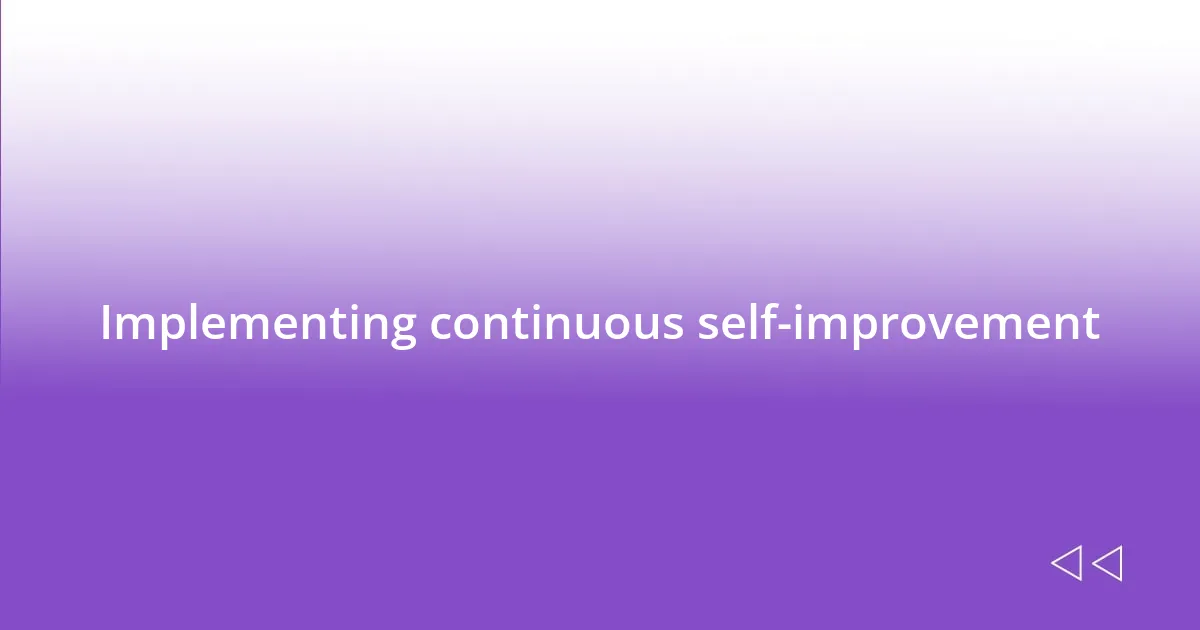
Implementing continuous self-improvement
Implementing continuous self-improvement has been essential in my competitive journey. I once participated in a workshop that focused on personal development, and it truly opened my eyes. Every session encouraged me to set aside time for self-reflection, analyze my progress, and identify areas for improvement. Have you ever taken a step back to evaluate your journey? This practice not only deepened my self-awareness but also ignited a drive within me to constantly seek out new skills and perspectives.
One particularly memorable moment was when I decided to invest in a coach. At first, I was hesitant—would it really make a difference? But the insights I gained were invaluable. It’s like having a mirror reflecting not just my strengths but also my blind spots. The coach helped me develop a tailored improvement strategy, pushing me to venture beyond my comfort zone. I learned that it’s vital to surround myself with individuals who inspire growth. Who are the people that challenge you to be better?
Another key element of continuous self-improvement is embracing a growth mindset. I can still recall when I faced a tough setback in a major competition. Instead of wallowing in disappointment, I promised myself to focus on the lessons learned. I analyzed my performance, pinpointing areas I could enhance. This attitude not only chipped away at my initial frustration but transformed it into motivation. Remember, it’s not just about competing; it’s about evolving into a more capable version of yourself each day. How does the idea of growth resonate with you in your own experiences?












